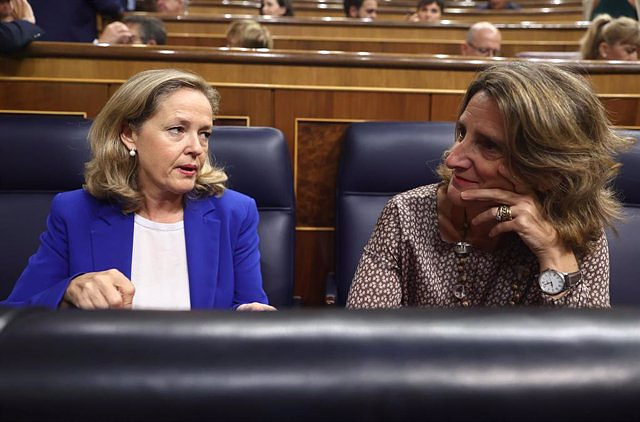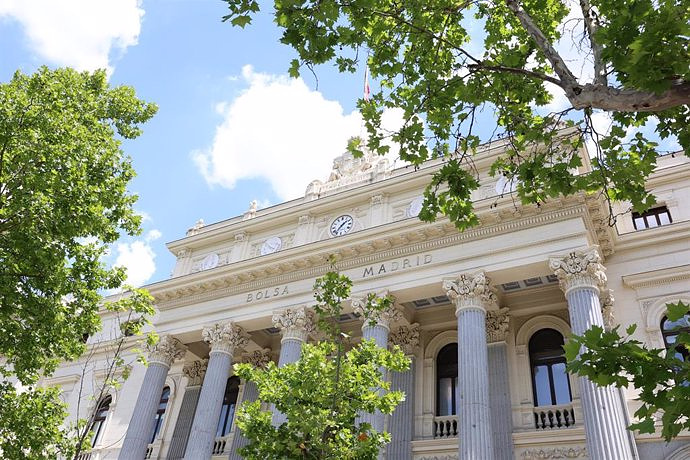MADRID, 21 Sep. (EUROPA PRESS) -
The Third Vice President and Minister of Ecological Transition, Teresa Ribera, has assured that consumers are paying between 20% and 30% less for the electricity bill than they would pay in the absence of the measures adopted by the Government and against of the PP criteria.
"Our consumers are paying between 20% and 30% less than what they would pay in the absence of the measures adopted by this Government and against the 'popular' criteria, but we also respond seriously and responsibly to the Union's request Union of being in solidarity with our neighbors in gas, electricity and economy and social support", Ribera stressed in the session of control of the Government in the Congress of Deputies.
In response to a question put by the 'popular' deputy Guillermo Mariscal, Ribera stressed that the Executive not only "respects and works" for compliance with the decisions of the European Union, but also contributes to identifying "early" and insist on the need for Europe to also respond to the energy crisis.
The Third Vice President and Minister of Ecological Transition has indicated that the 'Iberian exception' mechanism has allowed a reduction, compared to what could have happened in her absence, of around 20% in bills.
Said mechanism, as he has pointed out, has been complemented by the set of measures adopted by the Government "in advance", to which is added the opening of a "very important" debate on the energy crisis in a context marked by war of Ukraine that demands a response, at European level, "united, flexible and supportive".
In this sense, Ribera explained that 25% of electricity consumption in Portugal would not exist and would have to destroy demand, if there were no capacity to produce electricity and export from Spain to Portugal.
"What happens if we pay attention to this desire to extend the life of nuclear power plants beyond their design time, as is happening in France? That we would have to ask them to transfer to us all the electricity produced in all the neighboring countries, as is the case of France, whose most important hypothesis to get through this winter depends on the maximum export of electricity from all the neighboring countries to France", he added.
Finally, the 'popular' deputy asked Ribera if he agrees with the PSOE in the Parliament of Extremadura, which has supported the request to extend the useful life of the Almaraz nuclear power plant.
"I have not the slightest doubt that my fellow Extremadurans close ranks 100% with a program that is a national program and that makes a serious and strong commitment to the transformation of the energy system," Ribera responded.

 Exploring Cardano: Inner Workings and Advantages of this Cryptocurrency
Exploring Cardano: Inner Workings and Advantages of this Cryptocurrency Seville.- Economy.- Innova.- STSA inaugurates its new painting and sealing hangar in San Pablo, for 18 million
Seville.- Economy.- Innova.- STSA inaugurates its new painting and sealing hangar in San Pablo, for 18 million Innova.- More than 300 volunteers join the Andalucía Compromiso Digital network in one month to facilitate access to ICT
Innova.- More than 300 volunteers join the Andalucía Compromiso Digital network in one month to facilitate access to ICT Innova.-AMP.- Ayesa acquires 51% of Sadiel, which will create new technological engineering products and expand markets
Innova.-AMP.- Ayesa acquires 51% of Sadiel, which will create new technological engineering products and expand markets The plane with the mortal remains of the corporal who died in Poland lands in Torrejón de Ardoz (Madrid)
The plane with the mortal remains of the corporal who died in Poland lands in Torrejón de Ardoz (Madrid) Feijóo accuses Sánchez of seeking to "victimize" himself, "polarize" and mobilize the PSOE before Catalans and Europeans
Feijóo accuses Sánchez of seeking to "victimize" himself, "polarize" and mobilize the PSOE before Catalans and Europeans Venice begins charging 5 euros for tourists who want to access its historic center starting this Thursday
Venice begins charging 5 euros for tourists who want to access its historic center starting this Thursday Industrial inflation deepens its fall in March to 8.2% and accumulates 13 months of declines
Industrial inflation deepens its fall in March to 8.2% and accumulates 13 months of declines How Blockchain in being used to shape the future
How Blockchain in being used to shape the future Not just BTC and ETH: Here Are Some More Interesting Coins Worth Focusing on
Not just BTC and ETH: Here Are Some More Interesting Coins Worth Focusing on Retrópolis brings the golden age of video games and computing to the UPV
Retrópolis brings the golden age of video games and computing to the UPV Looking for video games that value the neighborhoods of Valencia
Looking for video games that value the neighborhoods of Valencia UPV researchers improve the efficiency of air conditioning systems using a geothermal heat pump
UPV researchers improve the efficiency of air conditioning systems using a geothermal heat pump València is committed to citiverse and smart tourism to be "the reference technological hub of the Mediterranean"
València is committed to citiverse and smart tourism to be "the reference technological hub of the Mediterranean" A million people demonstrate in France against Macron's pension reform
A million people demonstrate in France against Macron's pension reform Russia launches several missiles against "critical infrastructure" in the city of Zaporizhia
Russia launches several missiles against "critical infrastructure" in the city of Zaporizhia A "procession" remembers the dead of the Calabria shipwreck as bodies continue to wash up on the shore
A "procession" remembers the dead of the Calabria shipwreck as bodies continue to wash up on the shore Prison sentences handed down for three prominent Hong Kong pro-democracy activists
Prison sentences handed down for three prominent Hong Kong pro-democracy activists ETH continues to leave trading platforms, Ethereum balance on exchanges lowest in 3 years
ETH continues to leave trading platforms, Ethereum balance on exchanges lowest in 3 years Investors invest $450 million in Consensys, Ethereum incubator now valued at $7 billion
Investors invest $450 million in Consensys, Ethereum incubator now valued at $7 billion Alchemy Integrates Ethereum L2 Product Starknet to Enhance Web3 Scalability at a Price 100x Lower Than L1 Fees
Alchemy Integrates Ethereum L2 Product Starknet to Enhance Web3 Scalability at a Price 100x Lower Than L1 Fees Mining Report: Bitcoin's Electricity Consumption Declines by 25% in Q1 2022
Mining Report: Bitcoin's Electricity Consumption Declines by 25% in Q1 2022 Oil-to-Bitcoin Mining Firm Crusoe Energy Systems Raised $505 Million
Oil-to-Bitcoin Mining Firm Crusoe Energy Systems Raised $505 Million Microbt reveals the latest Bitcoin mining rigs -- Machines produce up to 126 TH/s with custom 5nm chip design
Microbt reveals the latest Bitcoin mining rigs -- Machines produce up to 126 TH/s with custom 5nm chip design Bitcoin's Mining Difficulty Hits a Lifetime High, With More Than 90% of BTC Supply Issued
Bitcoin's Mining Difficulty Hits a Lifetime High, With More Than 90% of BTC Supply Issued The Biggest Movers are Near, EOS, and RUNE during Friday's Selloff
The Biggest Movers are Near, EOS, and RUNE during Friday's Selloff Global Markets Spooked by a Hawkish Fed and Covid, Stocks and Crypto Gain After Musk Buys Twitter
Global Markets Spooked by a Hawkish Fed and Covid, Stocks and Crypto Gain After Musk Buys Twitter Bitso to offset carbon emissions from the Trading Platform's ERC20, ETH, and BTC Transactions
Bitso to offset carbon emissions from the Trading Platform's ERC20, ETH, and BTC Transactions Draftkings Announces 2022 College Hoops NFT Selection for March Madness
Draftkings Announces 2022 College Hoops NFT Selection for March Madness



























